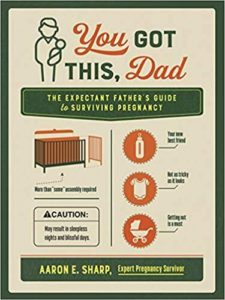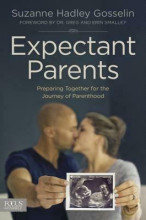Teaser:
Man #1: When I first found out my wife was pregnant, it was probably the most exciting moment of my life. I was so overtaken with emotions, I think I started crying and I just couldn’t stop hugging her, I was just so full of joy.
Man #2: As the pregnancy got in the third trimester and I saw the baby’s arm move under my wife’s belly, I thought, ‘There’s something in there!’
Man #3: My wife loves Chinese food, but when she got pregnant, she couldn’t eat it—it didn’t sound appealing at all. But she suddenly craved Mexican food. And it was kind of fascinating, like, ‘OK, let’s eat that now!’
Man #4: Generally speaking, I’d say if your wife starts to act a little crazy, uh, don’t take it personal, because she’s having a baby.
End of Teaser
John Fuller: (laughing) Some great comments there, reflections from dads about pregnancy and, uh, wives carrying babies. It’s a beautiful, overwhelming, often confusing time. And today on Focus on the Family, we’re gonna help new dads embrace their role, support their wife, and maybe even understand her a bit better during this exciting time. Your host is Focus president and author Jim Daly, and I’m John Fuller.
Jim Daly: John, I think today we’re gonna sound like a bunch of girls getting together, talking about their experience having a baby, but we’re gonna do it from the guy’s perspective today. I can remember, uh, Troy, my number two son when he was born. I mean, we had… I don’t know, Jean had a knack for starting labor, like at 1:00 or 2:00 in the morning, that was her (laughs), her pattern. And I can remember she woke up and she said, “Can you just massage the base of my back?” And I was doing that. And she goes, “Can you push harder because it hurts?” And I literally had my feet up against the wall, all my pressure. (laughing). And she was saying, “Can you do it harder ’cause it’s really… it’s not making a difference?” I went, “Are you in labor?” (laughing) And sure enough she was, her water broke. Uh, I did the two in the morning drive through the red lights thinking, “I wonder if, uh, cops are gonna pull me over.” I could say, “Lead us to the hospital.” But we got there to the hospital and like the door was shut at the maternity wing and I’m banging on the door, (laughing) we get in and a nurse is in there, “It’s okay. We got plenty of time, we got to do the paperwork.” And I went back out to hand my number one son, Trent off to my sister, again, 2:00 in the morning. And a nurse comes running out, it only been like seven minutes and this nurse came out to the parking lot yelling, “If you wanna see your baby born, you better come in now, it’s coming right now.” (Laughs) I was like, “Man, I made that within seven minutes.” I mean, that was crazy. You had a similar story.
John: Oh, yes. Well, we had one of our, our oldest daughter, uh, our third child, first pregnancy here in Colorado, and um, we were taking the doctor’s advice, I’m timing, contractions, we, we’re talking it all through, Dena’s in labor for a while. And um, she gets up and I go to the other room and I hear this, “John, it’s the baby.”
Jim: Oh my.
John: And I run into the bathroom and, and the baby-
Jim: To hide? (laughs).
John: And the baby is crowning, and so three pushes later I’m holding my daughter.
Jim: Oh my. I mean, so it’s born at your home?
John: So it was totally unexpected.
Jim: Okay. That tops it all.
John: It was a nice home birth.
Jim: Yeah, uh, that’s amazing.
John: It was a good time.
Jim: Were you cool and collected like you are every day here?
John: I was actually fairly calm, yes.
Jim: (laughs) And that’s, what gets your juice going if that doesn’t get it going?
John: Hospitals make me sick if that counts for anything.
Jim: (laughs) That’s crazy. Well, today, uh, we wanna spend some time helping new dads know how to support their wives before the baby is born, have your plan, understand what’s happening, don’t be surprised. And for the women in the audience, this may help you understand what we, as husbands are thinking and feeling during your pregnancy. We’re kind of doing this together, right?
John: We are. Yeah. It’s a team effort and we’ve got a pregnancy survivor with us, (laughing) Aaron Sharp. He calls himself a four-time pregnancy survivor.
Jim: (laughs) Good for you.
John: He and his wife, Elena have four kids, uh, ranging in ages from three to nine. He’s written a book called You Got This, Dad: The Expectant Father’s Guide to Surviving Pregnancy and uh, we’ve got copies of that here at the ministry. Our number’s 800, the letter A and the word FAMILY or stop by focusonthefamily.com/broadcast.
Jim: Aaron, welcome to Focus on the Family.
Aaron Sharp: Thank you. I’m glad to be here guys.
Jim: Okay. Let’s kick it off. You’ve got your story. You heard, uh, John and I explain ours. What was your, uh, story?
Aaron: So, we’ve got four kids and, uh, we, the only one, we have a really a story on is the first one, because the second two involved bedrest, and then the last one was an induction. And so, the story we have is from our very first one, which I think most people that’s where their story comes from.
Jim: (laughs) It’s true.
Aaron: Yeah. Uh, it was, uh, was a normal Wednesday morning. Elena was, you know, very pregnant at this point, but we weren’t, it wasn’t supposed to be time yet.
Jim: Yes.
Aaron: Because my first, the first book I ever wrote, the manuscript was due May 1st and our first child was due May 15th.
Jim: Good timing.
Aaron: And I thought, “This is perfect. I wrap up my book. I send it off. I’ve got two weeks to finish preparing, and this is wonderful. Uh, so then on April the 20th, (laughs) Wednesday morning, just normal, uh, I’m in the kitchen and all of a sudden, there’s this loud banging on the wall, coming from the bathroom (laughs). “Aaron.” “What, what’s going on?” “My water just broke.” And so, you know of I’m running around, like, what do we do? What do we do? What do we do? You know? And so, we, when we get to the hospital and then it’s, we spend all day there and it wasn’t till like 11 o’clock that night that we, we finally have our first child.
Jim: Yeah.
Aaron: And he came out cause he was just a little over 36 weeks, he ended up having to go to the NICU. And I had been told by Elena, and I’m sure most wives and husbands have this conversation. She said, “I don’t care what happens to me, when that baby comes out, that’s your responsibility.” She said, “I don’t care what’s going on in this room, my mom will be there, my sister, my fam- your family, we’ll have family. When that baby comes out, you follow that child.” Like I’ve been told by a very pregnant woman, “Under no circumstances do you leave this child’s side? (laughing) And so, we, we get to the nursery and the doctor comes over and tells me, “Hey, he’s a little early. We’re gonna have to put him in the NICU probably for a few days and so we’re gonna be taking him to the NICU.” So, I turned to my brother and sister-in-law’s and I say, “Hey, I’ve gotta go with the baby. I need one of y’all to go back and tell Elena what’s happening.” And they’re all like, “No.” Here’s the deal, I’m not going back in that room, because I’ve got to go with the baby or I’m gonna get murdered.”
Jim: I’ve been told.” (laughing).
John: I’ve got one thing to do here.
Aaron: Yeah, yeah. “I’m not the smartest person in the world, but I know I’ve got to follow this baby, so one of you has got to figure out to tell Elena where me and the baby are going.” So it’s kind of…
Jim: Well, I wonder how many of the listeners had this experience. So Jean had told me, “I’m gonna do this all natural on Trent, number one.” So she said, “Don’t give in to me asking for an epidural, (laughs) just don’t give in.” And I’m going, “this is a no-win situation.”
Aaron: Oh, yeah.
Jim: And sure enough, uh, you know, she’s in labor, we’re at the hospital and she is screaming at me, “Tell the doctor to get me that epidural now.” (laughing). And I, “But honey.” Oh, that was not good, “But honey, you told me.” Oh no, no, no. I saw something come out of her, that growl, (laughs) sounded like a bear. Um, and, uh, boy, she set me straight. I went running for the doctor, (laughs) change of mind. But anyway, so when you found out your wife was pregnant the first time, uh, you, you say you were like Spiderman just after he got bitten by the radioactive spider. How does that connect? (laughs)
Aaron: Well, you know, you, you think about it, you know, like your life at that moment, everything has changed for you, but you don’t know it. You know what I mean? Like the world is completely different, it just hasn’t hit you yet how different it is and that it is different. And so I think that’s the moment you’re like, Spider-Man getting bit by the spider, like he doesn’t know he’s about to be Spiderman, but everything just changed for him. And I think that’s the exact moment when, when your wife says, “Hey, we’re having a baby.” Like, there’s a lot of emotions that happen, but I don’t think you quite understand just yet what’s coming down the pipe.
John: So you’ve got your finger on something there, Aaron, which is that we guys tend to, um, not really share openly about our anxieties and our stresses. When you found out you were pregnant, um, somewhere in there, you lost your job and that probably just added to the level of stress.
Jim: Well, and a lot of people are in that spot right now.
Aaron: Yeah, absolutely. Well, and what we had to do is we had to decide, um, so I was employed, we were trying. I lost my job and it’s like, “Do we keep trying now?” And the decision we made was, you know, we felt like this is what God had for us, it was time to start trying to have a family. And so I don’t think God’s dependent upon our circumstances for that, I think this is something we felt like God wanted us to do as a couple, so I think we should just keep trying with that. And having no idea what that meant, of course, and then you get pregnant and now you’re thinking, “Okay. Now that we’re pregnant, I’m thinking maybe we should have changed our minds.” You know what I mean? Like, ’cause now that gravity is hitting you, I was trusting God, but now I really have to trust God-
Jim: Right.
Aaron: -and what his plan for us is. And so, yeah, that’s very nerve wracking. Uh, and you know, God worked it out. I mean, it was perfectly in a way that we could not have even imagined.
John: Yeah, but there was probably a time or two where you were biting your nails, thinking, “What in the world?”
Aaron: Oh yeah. Well, and the truth is, I was biting my nails. I’m pretty sure my parents were biting their nails. (laugh). I’m sure.
John: Cause they (inaudible).
Aaron: Yeah. I’m sure my in-laws were biting. I think everybody’s biting their nails. (Laughs)
John: That’s funny.
Aaron: Because they’re thinking like, “Aaron doesn’t have a job and there’s a baby on the way, what are we gonna do here?”
Jim: Let’s move to the emotions of pregnancy and that everybody’s going, “No, don’t do that.” (laughs) But many husbands are baffled by their wife’s emotions during the full nine months and I understand you and your wife had the, the biggest fight of your marriage and you can’t remember the details per se, which is funny, but what happened?
Aaron: So we, you know, this argument starts and it’s over something stupid, you know, ’cause they all are, you know what I mean? Very rarely are big arguments over something legitimate, you know what I mean? And so the argument starts and I’m realizing, I don’t realize at the time, I realized later reflecting back on it, what’s going on. Uh, but the hormones are just taking her for a ride. And so we’re sitting there-
Jim: Don’t ever say that to her.(laughs)
Aaron: Well, she said it to me later.
Jim: Right, that’s very good.
Aaron: Yeah, in the recap, she says, “I’m sorry, the hormones were taking me for a ride.” (laughs) “If you say so. If you say so.”
Jim: Yeah, yeah, yes dear. Yes, dear.
Aaron: Yeah, whatever you say. Um, but you know, so we’re, she’s struggling to kind of get this control of herself, of her emotions and I am not understanding. She’s coming at me in a way that she doesn’t know, that’s not normal. You know what I mean? And so I, uh, we’re sitting there, we have this huge argument and it’s stupid and I realized immediately that this is on me. You know what I mean? Like my very pregnant wife is over here now, you know, we’ve been going at each other, she’s crying, we’ve got three kids in the other room that have heard this, ’cause, you know, we’re all in the same house. And you know, we don’t live in a mansion, so they’ve heard us arguing and stuff. And so we realized we have to either at this moment, I have to say, “Listen, kids, dad was an incredible jerk to your mom.” Or I can say, “Hey guys, mommy’s pregnant.” And so I chose to tell them mommy was pregnant, so.
Jim: That was manly.
Aaron: I mean, you know, mommy’s bawling for one of two reasons, either I’m a horrible jerk or because she’s pregnant. So let’s go the pregnancy side.
Jim: No, but I appreciate the honesty in that. I think, uh, men, we really don’t know what to do, ’cause we’re fixers. How can we fix this? You ain’t gonna fix that. So, you just got to almost just say how what’s the best way I can respond to you right now.
Aaron: Well, and one of the first things I had to learn in marriage, I don’t know about you guys, but for me, one of the things I had to learn was, uh, Elena and I have a very different level of what I would call emotional intensity. I think about like the level of a car that idles, I sort of idle like at a two and she idles at like at a four or five. Like just emotional, she just is more, there’s more going on there. You know what I mean? Like my emotions are much simpler and everything. And I had to learn very early in marriage, a big mistake for me was when we got upset with each other, I would then match her level of emotional intensity. And it was a big mistake for me ’cause at a two, I don’t need to be jumping up. You know what I mean? Like, okay, jump up to a three, you know what I mean? But when I jump up like that, that’s not a good situation. And so, I had to, I’ve had to learn that. I thought I had learned it until we hit pregnancies. And then I realized (laughs) I had to go back and relearn it all again, because now her level of emotional intensity is so different because she’s not even always understanding what’s going on with her.
Jim: Yeah.
Aaron: And so, I’m having to then deal with someone who doesn’t even understand what’s going on with themselves, why [inaudible]. And so, it was a, it’s an interesting dynamic to have to get control of yourself –
Jim: Yeah.
Aaron: … when you’re dealing with somebody that doesn’t even understand what’s going on with themselves.
Jim: Good to remember this phrase. Can I just give you a hug right now? (laughs) That’s really good. That mostly works. Uh, you, uh, in the book compare hormones to fast balls. Now we’re talking guys lingo. (laughs) Uh, this is gonna be helpful to every guy listening. So how are hormones in a woman’s pregnancy similar to fastballs?
Aaron: So right after we had this amazing fight where I told all the kids that mommy was pregnant, I watched this documentary called Fastball and these guys have gone in and they, they did a lot of research on Nolan, Ryan and Bob Feller and all these famous baseball throwers. And they bring in these hall of fame batters. And it’s this huge documentary on what the fastest fastballs and what that is like.
Jim: Right, the physics of it.
Aaron: Yeah, the physics. It’s great. Well, they have George Brett on there and he’s talking about when a fastball is over a hundred miles an hour, it’s rising as it comes over the plate. Then they bring in this physicist that explains that that’s not possible because the ball is going down, and even as fast as it is, it’s losing speed so it can’t suddenly do this. That’s just not physically possible. But what happens is your brain, because it’s coming so fast, it doesn’t watch the ball the whole way. So, it sees the ball coming out of the pitcher’s hand and then your brain looks at the plate. And what happens is your brain basically fills in the blanks of what it thinks the ball’s gonna do. It comes in so fast, it doesn’t drop as much and it’s higher, so your brain thinks the ball went up because your brain was wrong about the flight path. And I watch, I’m watching this. And I was saying, “This is pregnancy hormones.” Because that’s… What happened with that fight was I was used to how we disagree with each other when we’re not pregnant.
Jim: In a normal situation.
Aaron: Yeah, and my brain filed the flight plan of we’re a little irritated, this isn’t a big deal. In a minute we’ll say we’re sorry and move on. And that’s not what happened. And it was, my brain was like, wait, this isn’t how this works. And the pregnancy hormones are that fastball jumping from 95 to 103. And your brains, your brain fills it a flight plan and it’s wrong because that’s not what’s going on here. And it was at that moment I was like, “I wish I had seen this documentary before that fight because maybe I would have understood this.”
Jim: Right. You definitely don’t want to lean into that pitch-
Aaron: No, no, no.
Jim: -and get hit by the ball. (Laughs)
Aaron: There’s no shame with bailing on the plate at that point, right? You know what I’ll, I’ll just get struck at it.
Jim: Here’s the question for the women listening so you can help them. What can wives do, uh, to help their husbands better understand their emotions and what they’re feeling? You know? ‘Cause sometimes it’s hard for the women to communicate. They’re just feeling it and they may even be embarrassed, or they don’t even know why. I don’t know why I’m going from, you know, enjoying this kind of food to this kind of food, just because I’m pregnant or, you know, whatever, it might be pickles with ice cream or more serious things emotionally, uh, you know, just flaring up and yelling at your husband, you don’t even know why. But what instruction would you give to the pregnant wives to help their husbands help them?
Aaron: Yeah. I think with a lot of things in marriage, it always comes down to communication. And I think one thing is wives need to do is to tell their husbands, like, “I need you to talk to me about what’s going on with you.” Because what happens to women a lot of times is, they are nervous and they feel like they’re the only ones because the future dad is over there being macho and saying, “Well, this is gonna be fine. I got all this.” And if he thinks he’s got it all together, um, he’s either lying or he just doesn’t understand what’s going on. (laughs) And I think that what they need to do is encourage their husbands that, “Hey, I need you to talk to me because that’s gonna help me to understand like myself, because even though I don’t know what’s going on with me, if I realize, hey, wait a minute, my husband who I think is I’ve married him for a reason, and I realize, hey, he’s nervous about this too and he doesn’t know how to do this and okay that’s gonna help me some.”
John: So, coach us though, Aaron, because that sounds like a big pit of quicksand. As soon as she asks me, I’ll say something and then this emotional thing starts happening. So how do we do that well?
Aaron: I think one of the things is, is for the couple to be specific about what they’re talking about. You know what I mean? Like not just say I’m nervous, ’cause that is quicksand, I’m nervous. What is it you’re nervous about? “Well, here’s the thing, I’m nervous about paying for college.” “Okay, well, let’s start there.” You know what I mean? There’s probably more you’re nervous about, but let’s talk about that. Pick out something specific and kind of go from there to where you there, the conversation sort of has a specific finger. “Hey, I’m nervous about giving the kid a bath.” You know what I mean? “Oh, okay. Well we can, you know.” And I think that helps to then each of you kind of have something to where you’re specifically talking about.
Jim: (Laughs) You are talking about college. I’m laughing, going. I don’t really know how to change a dirty diaper.
Aaron: Yeah, yeah.
Jim: That’s all I would be nervous about right now.
John: That’s a little more immediate.
Aaron: But I think most dads are gonna give you an answer that is less personal. (laughs) They’re gonna start out with, “I’m gonna pay for college,” ’cause that sounds like…
Jim: No, I think that’s probably true.
Aaron: You know, they’re gonna start out with that because that, Oh, well, yeah, a lot of people were worried about that. But most dads are gonna be like, “Ah, sure I can handle a diaper or whatever.” Until that happens and they [inaudible].
Jim: Okay. Let’s get to the nitty-gritty. Our producer for the show, Kathryn is pregnant right now and we have a clip from her husband. So, this is the real deal, let’s listen.
Speaker 4: So, I don’t know if sympathy, pregnancy symptoms are true, but the first time my wife got morning sickness and threw up, I then proceeded to throw up 30 minutes later. And then now times when she complains of being more tired, I feel a lot more tired too. Or if her back hurts, my back hurts. So, I think there’s something to it. (laughs)
Jim: Is there any truth to that? That’s funny. I think it’s a great excuse to get a nap, (laughs) but you know, um, researchers have found that… To answer that question seriously, they have found that there is some sympathetic symptomatic things that couples go through. Is it really true?
Aaron: I will, I think so, because I think there’s a lot of things that, like you said earlier, like the two of you are experiencing this together and there are things that she’s experiencing, there’s things you’re experiencing, but as a team, you’re both experiencing this together. So I think it’s more than just, she really wants Mexican food and I really want Mexican food, I think there is something to this, um, you know, becoming one flesh, I think there’s something going on there where we are as a team, we’re experiencing things.
Jim: You and your wife, uh, found that praying together really helped you. Now I think every wife is saying, “Hey, I don’t care if I’m pregnant or not pregnant, that really helps me in every way.” Speak to that, um, spiritual intimacy of praying together and having that kind of level of connection.
Aaron: Yeah. I think there’s something about men where we feel, we like to feel like we’re in control. And I think that’s why, at least me personally, why I struggled to pray a lot of times. ‘Cause I feel like, don’t worry God, I got this. (laughs) I don’t need to tell you I got it. You know?
Jim: Such a guy thing.
Aaron: Well, yeah. And it is, it’s just not something intentional. It’s just a, it’s all right, you get in. And I think pregnancy is one of those moments where you have to sit back and say, I, I’m not in control of this. This is a God thing. We’ve got medical professionals, but even sometimes they’re, they’re shrugging their shoulders about things. And it’s one of those moments that really underscores for you as a man and for women too, how little control you really have and how much, if this is gonna happen and go well, it’s gonna have to be God doing it. Because your part is a man has done, and this is all happening in her body and they’re going to checkups. And then there, and sometimes the doctor’s like, “Oh, everything’s great.” And sometimes the doctor’s like, “Well, we need to look at this.” And you know, so that all these things combined I think as a man is one of the slap in the face that, hey, I’m not in control of this, but I know who is.
Jim: Well, in fact, um, that was one of your experiences. And we’ve been very lighthearted about these things, but you and your wife had some intense emotions as a couple. Uh, you experienced a miracle in the ultrasound room. Many people will connect with this, what happened?
Aaron: So, we started trying to get pregnant the first time. And this is when I was employed, and we went for about six months and had a miscarriage. And we had the miscarriage like the same week I lost my job. And so that was just… So, it was just back in 2009, the economy was so bad, kind of like it is now. And so, you know, we have this, this intense moment of this miscarriage. We kept trying and six months later, I’m still looking for a job, but we have a positive pregnancy test. And so, we have the positive pregnancy test [inaudible], because of the previous, especially the previous miscarriage, the doctor was, you know, “Get the test, we’re checking on these things.” And you know, there’s all these numbers, they’re checking the hormone levels and all these things. And those numbers are supposed to go up progress at a certain point and Elena’s numbers weren’t going up and she was having some bleeding and some different things. And so, you know, it was concerning. There were some more tests. And then I remember distinctly it was a Thursday night and the doctor called Elena, this is the doctor my wife has had since she was in high school. So we’ve known… She’s a fantastic Christian lady. My wife’s known her for decades. And she calls Elena and says, “Listen with where things are at here’s where we’re probably headed. We’re probably headed for another miscarriage. Not every time, but I’ve been doing this for a long time, and you need to know most of the times what’s happening to you, there’s a miscarriage on the way. But there is hope, but I want you to understand reality of what we’re dealing with.”
Jim: Oh, that’s good.
Aaron: And then she said, “If you’re still bleeding tomorrow, I need you to come in.” So, we get up in the morning, we’re still having these, these symptoms. And so, we drive to the hospital. It was about a 40-minute drive from where we live. And it’s like this just somber, you know, ’cause we’re gonna be told this didn’t happen. And you, even in your mind, you’re like, there’s hope, but you’re having to prepare yourself, right? So, you’ve got to kind of deal with both of these things. And so we get to the doctor’s office and the first thing you do is you go to the sonogram room and we go in there waiting to be told, “I’m sorry, this is not gonna happen this time.” And they put it on there and you hear this boom, boom, boom, boom, boom. And this heart is just like beating like crazy. And we were just, even now, I’m like, you know, there is this moment of where you’re waiting to hear, I’m sorry, what you hear is like this heartbeat.
Jim: Everything looks good.
Aaron: Like God is like, “Listen, don’t worry. Forget the numbers.” You know what I mean? “Like I’m doing this.” And we had this praise session with our doctor. She was just like, yeah. You know, it was fantastic to see this moment of like dreading, we were so much dread. And then it was just like the exact opposite.
Jim: Well, and I, I, you know, acknowledge the fact that some couples listening right now, maybe didn’t get that heartbeat.
Aaron: Yeah, absolutely.
Jim: And that happens. And I, you know, I, our hearts go out to you and um, you know, thank the Lord that that child is with the Lord in heaven, in my opinion.
Aaron: Yeah, absolutely.
Jim: And uh, you know, then you try again. Let me ask Aaron in the midst of all of it, and this gets down to some concreteness for the guys. Um, you encourage first-time parents to slow down and take it all in. And give us a couple examples of how you did that. I like that advice ’cause we get so caught up in the function and the plan and where we’re going, that we don’t actually stop and really soak it in because it’s only gonna happen maybe once, maybe a few times, but it’s not like an everyday event having a child.
Aaron: Yeah. And you do these things and you, you don’t know if you’re ever gonna do them again. You know what I mean? You prepare a nursery and you go register for baby showers and you do these things and you just don’t know, like we’ve got four kids. We think we’re through, you know, God may have other plans, but that was, we think we’re done. I’m an only child and my parents intended to have more kids, it just never worked. So you don’t know how many times you’re gonna go down this path and I just want dads and moms, ’cause there’s so much going on, especially, you know, if you’re working and you’re doing all of this because you know, we both worked full-time every pregnancy and you know, all this is going on. Just treasure those moments. Go in the nursery and just sit there and just look around and like, look at that nursery, you know what I mean?
Jim: And pray.
Aaron: Yeah, absolutely.
Jim: Yeah.
Aaron: When you get to the hospital, like take the time. I mean, obviously if you’re rushing in to, to get her there and do that, but once that’s done take a moment and just sort of like look around and just think about this moment that you’re in, that God has brought you to. And you don’t know if you’ll ever be here again and just thank him for that, for being there and just, you know, and there’s so much that where you’re doing all these things, but take the time, think about when you, when you’re telling the kids, “Hey, mommy’s pregnant,” just treasure that moment.
Jim: Yeah. We’re right here at the end there. And I want to ask this question as well. There’s gotta be a man listening who, with all the brokenness in the world that we have, maybe didn’t grow up with a father, didn’t have a good model of a father. You know, it was a disastrous example. Um, so he doesn’t think he can be a good dad, or he has questions about whether or not he could do it because he didn’t see it, he didn’t have it modeled to him. What are some things that you would say to that man, that you can break the curse, basically you can change things?
Aaron: You know, I think there’s two things that I would think about immediately. And I had a great example as a father. But I think there’s two things that have proven to me to be something that I need to always do with my kids. One of them is to be honest and the other one is to say, I’m sorry, like there’s no tomorrow. Um, you know, our kids, like I, I blow it. Over this last year during this pandemic time with kids at home, I’m working at home, I mean, it has been crazy. And there’s been so much I wasn’t ready for, you know what I mean? Like always before I would go to work and then come home, and I was a dad and I worked for a great organization that wants to maintain that. But now like I’m working and we’re all there together and we’re doing this stuff and I think telling your kids, “Hey, you know what, here’s the deal. Sometimes daddy struggles to be patient when I’m working, I need to be patient with you. And sometimes I’m not. And I’m sorry about that.” I think every time you apologize to your kids, I think you just grow, you grow-
Jim: And they grow.
Aaron: -and they grow, and I think you grow in their eyes. I think they see, hey, dad is not perfect. Dad knows he’s not perfect and dad’s willing to own it. And I think that sets a pattern for them-
Jim: I agree.
Aaron: -of I don’t need to be perfect, I just need to be willing to own up to my struggles and work on them.
Jim: That’s so good.
Aaron: You know, our oldest he’s nine and he’s, he’s the first child perfectionist. So, we’re always working with him on that. And I want him to see that example of I’m not looking for perfection, I just want you to own where you need… Where God needs to help you grow and let’s do it together.
Jim: Aaron, that is such good advice all the way around. And this has been terrific. I’ve really enjoyed it. I wasn’t sure that I would, to be honest at that. Okay, talking about pregnancy. (Laughs) But, uh, this has been good. It’s been really enlightening. I hope the listeners have been able to take nuggets away from this, that they can apply to their lives. And really, uh, if you know somebody who is a, um, first time dad, or even going through it second, third time, this might be the book for them, or maybe you’re in that spot, uh, get a copy right here at Focus on the Family. The title again is You Got This Dad: The Expectant Father’s Guide To Surviving Pregnancy. Uh, we’ll make that available to you. If you can give a gift of Focus of any amount, we’ll send it to you as our way of saying thank you. And let me remind everyone that in the past year, uh, as you’ve supported Focus on the Family, we together have helped over 300,000 parents and expectant parents, uh, through those transitional phases. And that’s a great achievement. I’m so grateful to the Lord for allowing us to be a part of that journey with those that are in that giving birth state. That’s wonderful. And, uh, Aaron, again, thank you so much for being with us. I really appreciate it.
Aaron: Glad to be here guys.
John: Well, we’ll encourage you to get in touch and to donate as you can and get your copy of this great book, You Got This Dad. Our number’s 800, the letter A and the word FAMILY, or online we’re at focusonthefamily.com/broadcast. And be sure to join us next time as we hear powerful stories of two people who struggled with gender identity.
Teaser:
Walt Heyer: You can’t affirm somebody in a different gender without, uh, at the very same time saying there’s something wrong with you the way you really are.
End of Teaser
John: On behalf of Jim Daly and the entire team, thanks for joining us today for Focus on the Family. I’m John Fuller, inviting you back as we once more help you and your family thrive in Christ.






















